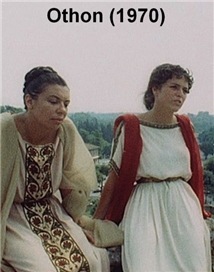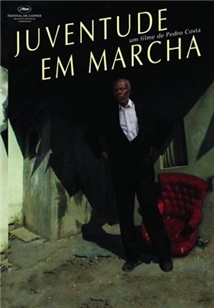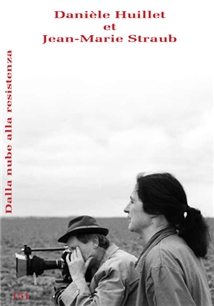
Film
drama (1970)
Les yeux ne veulent pas en tout temps se fermer, ou Peut-être qu'un jour Rome se permettra de choisir à son tour
Za sve opcije molim te da se prijaviš ili registriraš!

Naslov:
Les yeux ne veulent pas en tout temps se fermer, ou Peut-être qu'un jour Rome se permettra de choisir à son tourLeto:
1970Zvrst:
dramaTrajanje:
88 minRežija:
Danièle Huillet, Jean-Marie StraubScenarij:
Pierre CorneilleGlavne vloge:
Adriano Aprà > Othon
Jean-Claude Biette > Martian
Olimpia Carlisi > Camille
Eduardo de Gregorio > Atticus
Ennio Lauricella > Galba
Marilù Parolini > Flavie
Sergio Rossi > Rutile
Jean-Marie Straub > Lucus (as Jubarite Semaran)
Anne Brumagne > Plautine
Gianna Mingrone > Albiane
Anthony Pensabene > Vinius
Leo Mingrone > Albin
Povzetek:
Pierre Corneille's Othon adapted faithfully to cinema, set in the ruins of the Rome of now-a-days.
- Poglejte podobne vsebine
- Komentarji filma/serije

Jayu manse (1946)
drama
Tells the story of a Korean resistance fighter leading the fight for freedom from the occupying country of Japan.

Juventude Em Marcha (2006)
drama
After the Portuguese government demolishes his slum and relocates him to a housing project on the outskirts of Lisbon, 75-year-old Cape Verde immigrant Ventura wanders between his new and old homes...

Dalla nube alla resistenza (1979)
drama
Two segments. The first one arranges six stories from Cesare Pavese's "Dialoghi con Leuco", taken from classical mythology. The second segment is taken from Pavese's novel "La luna e i falo": after...

Chronik der Anna Magdalena Bach (1968)
biografija, drama, zgodovina, glasbeni
A chronicle of Johann Sebastian Bach's life, eschewing drama to focus almost entirely on his music. Narrated by his wife Anna in voiceover, it consists largely of static scenes of Bach conducting...

Za komentiranje morate biti prijavljeni!